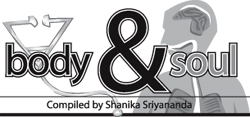|

Excessive vomiting in pregnancy
by Dr. Vijith Vidyabhushana
Consultant Obstetrician and Gynaecologist Teaching
Hospital, Kalubowila
 Nausea and vomiting can be one of the first signs of pregnancy and
usually begins around the 6th week of pregnancy. Nausea and vomiting can be one of the first signs of pregnancy and
usually begins around the 6th week of pregnancy.
About 50-75% of pregnant women feel nausea or vomit during early
pregnancy. It is often called ‘morning sickness’, but symptoms can occur
at any time - not just in the morning and also it may start as early as
4-5 weeks or later with in first 12 weeks of pregnancy.
Symptoms are mild in most cases. Feelings of sickness (nausea)
typically come and go. They usually last between 1 and 4 hours at a
time. Some women have more severe symptoms and have frequent and/or
longer bouts of vomiting. In most cases the symptoms have gone by 12-14
weeks of pregnancy. However, about 10% of pregnant women have some
nausea throughout their pregnancy.
If you experience excessive vomiting and cannot keep your food down,
you may have ‘hyperemesis gravidarum’ i.e. severe vomiting specific for
the pregnancy.* *Hyperemesis gravidarum can be harmful to you and your
baby if severe and left untreated. This is due to the possible lack of
nutrients and electrolyte imbalance. The most important thing is to
inform your health care provider when these symptoms appear and discuss
possible options for treatment.
The cause of the sickness is not known. It is probably due to the
hormone changes of pregnancy. Some think that it is related to the
amount of a hormone produced by the placenta called Human Chorionic
Gonadotrophin (hCG) and hence excessive vomiting is commonly seen in
twins where the placental mass is more.
This is a reason for every pregnant woman who has severe vomiting to
undergo an ultrasound scan to see if she is carrying twins.
But it not usual to get excessive vomiting for the first time after
12 weeks of pregnancy. If you get excessive vomiting for the first time
after 12 weeks it may be due to hidden infection like a urine tract
infection.
Here are some frequently ask questions.
Does it affect my baby?
Not usually. The baby gets nourishment from your body’s reserves even
though you may not eat well when you are vomiting. The effort of
retching and vomiting does not harm your baby or cause a miscarriage.
The only time your baby may be affected is if you become very ill
with dehydration which is not treated, resulting in accumulation a
harmful substance called ketones in blood and urine. When there is
dehydration and lack of energy, the liver produces this substance (ketones)
to provide energy, but this substance can be harmful to the baby.
Other causes
Remember, not all vomiting may be due to the pregnancy - you can
still get other illnesses. For example diarrhoea, blood in vomit,
jaundice (yellow skin and eyes), high temperature (fever), and stomach
pains may be due to an infection or some other problem unrelated to
pregnancy. See your family doctor or Gynaecologist if these symptoms
occur, or if the vomiting is severe and you suspect that you are
becoming dehydrated.
Even urinary tract infection, respiratory tract infection can give
rise to vomiting. Hepatitis is another cause for vomiting. Hyperemesis
gravdarum should be diagnosed after exclusion of above causes for
vomiting.
There are a number of do’s and don’ts you can try to help alleviate
your symptoms.
When do I have to seek medical help?
If you are experiencing excessive nausea and vomiting that prevents
you from keeping any food down.
If vomiting is accompanied by pain or fever.
If nausea and vomiting persists well into the second trimester (after
13th week). If you just don’t feel right. ‘Morning sickness’ is the
nauseated feeling you experience in your first trimester. It usually
starts out in the morning and wears off as you become active throughout
your day. Not all morning sickness remedies will work for you, but these
are just a few remedies and comforts that have helped other women get
through their day.
‘Hyperemesis gravidarum’ is a condition characterized by severe
nausea, vomiting, weight loss, and sometimes electrolyte disturbance.
Mild cases are often treated with dietary measures, rest and antacids.
Severe cases often require a stay in the hospital so that the mother can
receive fluid and nutrition through an intravenous line. DO NOT take any
medications to solve this problem without consulting your health care
provider first.
Do I need any treatment?
‘No treatment’ is needed in most cases as the symptoms are often
mild.
Eating small but frequent meals may help. Foods high in carbohydrate
are best, such as bread, crackers, etc. Some people say that sickness is
made worse by not eating anything at all. If you eat some food
regularly, it may help to ease symptoms. Eating a plain (or ginger)
biscuit about 20 minutes before getting up is said by some women to
help.
Some women find that a ‘trigger’ can set off the sickness. For
example, a smell or an emotional stress. If possible, avoid anything
that may trigger your symptoms.
Have lots to drink to avoid dehydration (low body fluid). Drinking
little and often rather than large amounts may help to prevent vomiting.
Try to aim to drink at least two litres a day. Water is probably the
best drink if you are feeling sickly. ‘An anti-sickness medicine’ may be
advised if symptoms are severe, or do not settle.
It is generally best to avoid medicines when you are pregnant
(including herbal remedies as the contents are often uncertain).
However, most medicines that have been used for morning sickness or
hyperemesis have been used for a number of years and are thought to be
safe.
For example, many women have used promethazine, cyclizine,
metoclopromide etc and there is no evidence that they harm a developing
baby. Always see a doctor before taking an anti-sickness medicine when
you are pregnant.
‘Hospital care’ is needed to give fluids by a ‘drip’ in small number
of women who become quite ill and dehydrated (low in body fluid).
Lifestyle-related maladies, bane of society
“Cancer, diabetes, heart and brain diseases are lifestyle-related
diseases. People can prevent contacting those diseases by practising
health-conscious living,” said Dr. Hiroshi Kobayashi, Chairman of the
Japan Sapporo Cancer Seminar Foundation recently.
 He was addressing a one-day workshop on “Prevention of
lifestyle-related Diseases in Sri Lanka” held in Colombo. He also said
that the recurrence of lifestyle-related diseases are increasing in Sri
Lanka and these diseases are the main causes of death in the country. He was addressing a one-day workshop on “Prevention of
lifestyle-related Diseases in Sri Lanka” held in Colombo. He also said
that the recurrence of lifestyle-related diseases are increasing in Sri
Lanka and these diseases are the main causes of death in the country.
Dr. Kobayashi said “We have to pay attention to the gradual increase
amongst the Sri Lankan people of such lifestyle related diseases as
cancer, heart attacks, cerebrovascular diseases, and diabetes.
Since people’s prolonged life-span will render them more susceptible
to such diseases, it is likely that in the near future such a
development will have a marked effect upon the already critical
condition of the national budget.
“Some of my Sri Lankan friends have suggested that we might overcome
the difficulty through the early detection of diseases, and it is right
that such early detection is something that we ought to seek to achieve.
Yet since the budgetary resources required for the early detection of
cancer, for example, are extremely limited, and because the cost of the
advanced medical equipment required for the early detection of cancer is
prohibitive, only a small number of potential patients will be able to
benefit from such ‘early detection’ procedures.
“How, in the future, will Sri Lanka be able to cope with this
problem? To put it simply, I believe that we have, as individuals, to be
responsible for our own health, particularly with regards to the
prevention of disease.
No one is able to escape death, but we are all anxious to live as
long as possible in the best possible state of health. If we hope to do
so, we need to look again at the social environment and the way in which
we live our daily lives.
“I would like here to propose six topics that I have myself chosen,
with reference to certain guidelines laid down by WHO (World Health
Organisation) and UICC (Union Internationale Contre le Cancer), under
which we may find the most reliable evidence of ways towards the
achieving of healthy longevity.
“Surprisingly, perhaps, a campaign to prevent cancer is also
applicable to the prevention of other lifestyle-related diseases.
Prof. Kono added, while the overall incidence of cancer shows a
relatively small geographical variation worldwide, the international
variation is phenomenal when cancer is seen by site or type. For
example, male lung cancer shows a 30-fold difference between the regions
with the lowest and highest rates.
Colorectal cancer incidence rates are highest in Japan, Australia/New
Zealand, North America and Western Europe. The rates in these regions
are approximately ten fold higher than reported for the South Central
Asia. Japan, Korea and North China have the highest rates of gastric
cancer in the world.
Again, a 10-fold difference is noted between Japan and South Central
Asia for gastric cancer incidence. Oral and oesophageal cancers are much
less than gastric and colorectal cancers in the world, but oral cancer
incidence is the highest in South Asia, probably due to betel chewing.”
“Obesity and lack of physical activity have prevailed massively
across the world with exception in areas suffering poverty and
starvation. Many epidemiologic and laboratory studies have accumulated
substantial evidence that obesity and lack of physical activity confer
increased risk of colorectal cancer.
As regards foods, high consumption of vegetables and low intake of
red meat are recommended for the prevention of colorectal cancer.
Calcium, vitamin D and folate seem to be important in the prevention of
colorectal cancer, but consolidating evidence deems to be waited for.
Helicobacter pylori infection is a causal agent for gastric cancer,
but the infection is so ubiquitous, i.e., 50-60% in developed countries
and 70-80% in developing countries. There is no sex-difference in the
infection of this bacterium.
Thus factors other than Helicobacter pylori infection play an
important role in the development of gastric cancer. In East Asia with
the highest rates of gastric cancer, high intake of salt-preserved foods
are traditional. High intakes of salt or salty foods considered to
probably increase the risk of gastric cancer.
daily amount of 6 g is recommended internationally, but 10 g per day
is a guideline in Japan. High intake of vegetables and fruits are
important in the prevention of gastric cancer. Limited evidence
indicates that chili may increase gastric cancer risk and that tea may
be protective. Tobacco and alcohol are major causes of oral and
oesophageal cancers, but high intake of vegetables and fruits are
protective against these cancers as well.”
Compiled by L. S. A. Wedaarachchi
Psychological rehabilitation after a heart attack or a bypass
By Dr. R.A.R. Perera
Consultant Clinical Psychologist, Asiri Hospital, Colombo.
The current criteria to diagnose a heart attack require two out of
three from; chest pain, ECG changes and an enzyme rise to twice the
laboratory upper limit of normal.
Reactions to the unexpected onset of a heart attack or bypass surgery
can be generally explained using a ‘loss model’. The possible losses
include life, health, independence, social role, sexual activity,
employment, leisure activities and financial security. The possibility
of future loss produces anxiety and depression. Observed anxiety tends
to be more pronounced than self reported anxiety because of denial.
As a result of selective attention, a person after a heart attack or
bypass surgery, subsequently notices and worry about a number of
different chest pains, which they would have previously ignored. The
pulse, and its irregularities, is noticed by feeling the pulse or
hearing when the ear is on the pillow at night. Simple reassurance is
the only therapy required.
Depressed mood is very common in these patients and tends to occur
later in the recovery phase after a heart attack or bypass surgery. It
is mainly an adjustment disorder with a depressed mood. One third of
patients have been demonstrated to have significant depression
persisting one year after a heart attack or a bypass surgery. It is
often the cause of fatigue, irritability and reduced concentration and
sleep disturbance.
Cognitive behavioral therapy programs have been demonstrated to
reduce depression and anxiety in patients after a heart attack or bypass
surgery.
Very occasionally patients may need medications for depression. But
care is needed when antidepressant drugs are given to heart patients.
Non treatment of depressed mood can cause repeated hospital admission of
a heart patient.
When a heart patient is discharged home from hospital, the partner
perceives responsibility to have been transferred to them from the
hospital doctors. This can result in close scrutiny, which can be quite
disruptive.
For the first time partners notice normal pauses in respiration
during sleep. More often, the patient is woken to see whether or not
they are still alive.
Over protectiveness can result in patients being restrained from
activities for which they are already fit. Normal sexual activity can be
resumed when the patient is able to walk briskly up two flights of
stairs. This is usually possible within two weeks of their heart event.
Special care should be taken of those who are socially isolated or have
poorer levels of education.
Many of these patients can return to driving within four weeks after
the heart attack or bypass surgery.
Employers fear continuing the employment of those who have had heart
attacks or undergone bypass surgery. They need the responsibility to be
taken by the doctor. The medical certificate needs to state that the
patient can return to work ‘without any limitation of any kind. If there
is any limitations, it needs to be specified.
Rehabilitation programs after a heart attack or bypass surgery should
include physical, psychological and social recovery. It assists the
secondary prevention of heart disease through identification and
modification of risk factors and by improving compliance with medical
therapies. |
